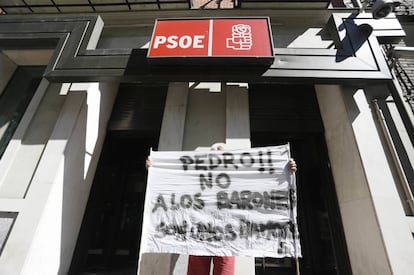Police ready to quell potential trouble at Spanish Socialists’ crisis meeting
Embattled leader Pedro Sánchez asks supporters not to rally outside party headquarters on Saturday

The chain of events triggered by the sudden resignation of over half the Socialist Party (PSOE)’s executive board on Wednesday represents a new twist in Spain’s unraveling political scenario.
The main opposition party has effectively split into supporters of Secretary General Pedro Sánchez, who refuses to support a minority government led by the Popular Party (PP), and detractors who feel that he should step aside.
One Socialist official has already apologized for “this deplorable spectacle”
Instead, Sánchez has called an extraordinary meeting of the Federal Committee, a 290-member body, for Saturday at party headquarters in Madrid. His goal is to secure approval for an express party conference and primaries to either confirm him as the party leader or choose someone else.
The move met with strong opposition from high-placed officials, leading to the unprecedented decision by 17 executive board members to resign in a bid to force Sánchez out and prevent the party conference and primaries from taking place.
But Sánchez is digging his heels in, claiming that internal regulations are unclear about the present situation and that he remains the party’s top leader.
On Friday, Sánchez and his remaining allies on the board declared themselves to be “an interim Federal Executive Commission” and said they would go ahead with plans for the Saturday meeting of the larger Federal Committee.
Bracing for trouble

Following scenes of confusion on Thursday, the PSOE’s “interim executive” has released a statement from party headquarters, which remain under Sánchez’s control, asking supporters not to rally outside their doors on Saturday during the Federal Committee gathering.
“The interim Federal Executive Commission wants to convey a message of calm to Socialist members and sympathizers during these difficult and exceptional times for the party. Now more than ever, it is necessary for us Socialists to be a role model of maturity and prudence,” reads the statement.
But the government is already planning to beef up police presence outside PSOE headquarters on Ferraz street in preparation for potential trouble, the EFE news agency reported. On Friday, Sánchez sympathizers stood outside the building, and one individual had hung a large bedsheet outside the door with the following entreaty scrawled in black letters: “Pedro!! Say no to the barons!”
And one Socialist official, Federal Committee member María González Veracruz, has already apologized “in the PSOE’s name” for “this deplorable spectacle,” adding that “things should never have come to this.”
Acting PM, acting opposition
Essentially, after two general elections and nine months of deadlock, Spain now has an interim prime minister and an interim leader of the Socialist Party. And with the PSOE in crisis mode, the chances of a governing deal being struck in time to avoid a third general election in Spain are increasingly dim.
For now at least, acting Prime Minister Mariano Rajoy is still considering Sánchez the Socialist leader in Congress.
“We are not the ones who should decide whether there are changes or not in their representatives, considering the ongoing proceedings,” said Deputy Prime Minister Soraya Sáenz de Santamaría on Friday. “We have no place in that process; we respect it and hope that the PSOE will resolve it.”
Meanwhile, the secretary general of the anti-austerity Podemos, Pablo Iglesias, on Friday tweeted: “My position is clear: a coalition government with the PSOE. We’ve been saying it for the last 11 months.”
English version by Susana Urra.
Tu suscripción se está usando en otro dispositivo
¿Quieres añadir otro usuario a tu suscripción?
Si continúas leyendo en este dispositivo, no se podrá leer en el otro.
FlechaTu suscripción se está usando en otro dispositivo y solo puedes acceder a EL PAÍS desde un dispositivo a la vez.
Si quieres compartir tu cuenta, cambia tu suscripción a la modalidad Premium, así podrás añadir otro usuario. Cada uno accederá con su propia cuenta de email, lo que os permitirá personalizar vuestra experiencia en EL PAÍS.
¿Tienes una suscripción de empresa? Accede aquí para contratar más cuentas.
En el caso de no saber quién está usando tu cuenta, te recomendamos cambiar tu contraseña aquí.
Si decides continuar compartiendo tu cuenta, este mensaje se mostrará en tu dispositivo y en el de la otra persona que está usando tu cuenta de forma indefinida, afectando a tu experiencia de lectura. Puedes consultar aquí los términos y condiciones de la suscripción digital.








































